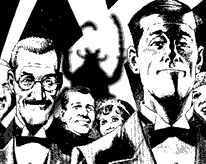 The
Conference The
Conference
Daniel Gascón
translated from the Spanish by
Don Bartlett, Evelina Guzauskyte
& Anne McLean
The conference on Kafka’s Metamorphosis opened in the
Great Hall of the University. The participants hadn’t got their nametags yet; the
canapés were still being prepared in the bar. The Chairman presented the themes of the
conference in some detail and thanked the Cultural Attaché for all his support. The
Cultural Attaché spoke about the conference themes and thanked the Chair for all his
efforts. The Dean of the Faculty thanked the Attaché and the Chair for their enthusiasm.
By the time they’d finished, the canapés were just perfect.
The first day Luigi Francescoli read a paper on
Kafka’s work and how it had suffered at the hands of traduttori and tradittori.
Thus, he said, it was a metamorphosized metamorphosis, and looked very pleased with
himself. He read out several paragraphs and misinterpretations in several languages,
including Chukoto. After the coffee break, a professor from the local university
—head of the Department of Literature and Zoology, whose treatise The Role of the
Hummingbird in the Spanish Realist Novel was currently being translated into
Chukoto— spoke about insects and arachnids. She quoted Vladimir Nabokov and Javier
Tomeo and mentioned that the kind of insect Gregor Samsa turned into was frightfully
common in temperate climates and German Expressionism.
The Conference Chair had chosen to close the first day
by inviting three writers to a round-table discussion. The first described how he’d
discovered Kafka in the marvellous library belonging to his uncle, a republican persecuted
after the Civil War; the second told how he’d first read Kafka in the house of a
kindly, short-sighted neighbour, married to a much younger woman. It was her
beauty, he maintained, which first gave him a taste for literature. The
third, for his part, said he’d never read Kafka but planned to do so right away, and
as for the dispute between Kafka and his father, he took the father’s side.
The dinner was a somewhat chilly affair, and there
were only a couple of academics with bags under their eyes the following day, which
promised to be very exciting. Gender and Psychoanalytic Studies were on the agenda.
Professor Lola Granado spoke on the function of female characters in Metamorphosis
and the passive role women are allotted in the work of Kafka, a man who clearly never knew
how to handle them. The audience applauded enthusiastically. The presentation had been
brilliant; and also, the professor’s father was said to be seriously ill.
They then showed slides of Prague, and some professor
no one had ever heard of, or, the K Factor, as he himself preferred to be called,
drew the exact layout of Gregor Samsa’s room on the blackboard, complete with bed and
window, without a single judgmental comment.
Raul Schwerstein took an interesting psychoanalytic
approach (Freudian school, mainstream tendency) to Metamorphosis and Letter to
My Father. Straight after lunch, he spoke about the uterine regression to the room and
about the connection between monsters and what quivers chaotically deep within us, and
used K’s drawing to point out the similarity between the womb and Gregor’s room.
He also remarked that the newspaper Kafka’s father used to read —printed on
rhythmical rollers recalling the primal scene of parental coitus— would turn into a
phallic object when rolled up. Raul Schwerstein didn’t say much more. His wife kept
flashing smiles at Dr. Francescoli, who spoke twelve languages and suffered from priapism.
A round-table discussion with three writers began as
it was getting dark. Laura Moreno told how —in a bookshop run by a defeated Civil War
veteran, who’d spent two decades in prison— she’d bought an Argentinian
edition of Metamorphosis translated by Borges in his own inimitable style. Ruben
Altaba —latest winner of the Lechago Prize and proud owner of a brand-new Peugeot
406— said he’d read Metamorphosis in a prison cell in the early 70s, in
those gloomy years, and that a girlfriend with short hair had given him a copy of the book
with a file hidden inside. Finally, Alicia Gimeno confessed, somewhat shamefaced, that
she’d read the book in the town library. A gentleman in the audience called her a
reactionary.
To conclude the day’s events they showed two
films. One of them was a new take on Kafka’s story against the backdrop of a nuclear
apocalypse. The other presented it as a metaphor for AIDS, and the Conference Chair
advised everyone present to take suitable precautions.
Perhaps because they didn’t pay him much
attention, there were few witnesses to the opening session of the third day and even the
speaker, Marcos Römerbräu, confessed to feeling somewhat absent during the presentation
of his paper, entitled Metamorphosis: Taxonomy and Confusions. Since hardly anyone
was there, his parting shot was a burningly topical Kafkaesque question: had Max Brod
destroyed his friend’s work, how would the lack of Kafka have been experienced in
later literature?
The closing session was to be a round-table with an
artist, a professor from the University of Hawaii (of dubious distinction, but everyone
wanted to go there as visiting lecturers) and a philosopher of some standing. It was
summer; the sun filtered through the blinds. The windows were open and people were fanning
themselves with their conference programmes. Everybody was eagerly anticipating the
contribution from the thinker Adolfo Aligustre. Nobody, however, was prepared for what
happened next.
When the time came, Adolfo Aligustre smiled sadly and
flew out through the window, transformed into a butterfly.
|
 The
Conference
The
Conference